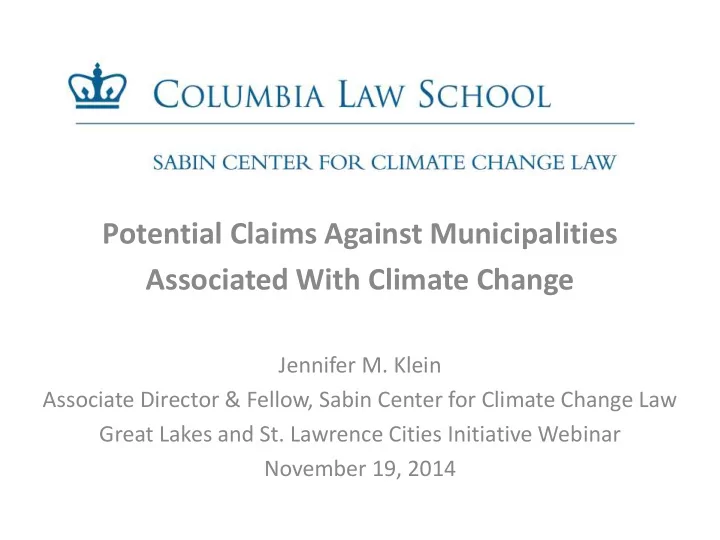

Potential Claims Against Municipalities Associated With Climate Change Jennifer M. Klein Associate Director & Fellow, Sabin Center for Climate Change Law Great Lakes and St. Lawrence Cities Initiative Webinar November 19, 2014
1958-2012
2071-2099 compared to 1970-1999
1991-2011 compared to 1901-1960
Illinois Farmers Insurance Company v. Metropolitan Water Reclamation District of Greater Chicago
Liability Theories in Illinois Farmers Insurance • Failure of local public entity to exercise ordinary care to maintain property in safe condition – 745 ILCS §3-102(A). • Negligent failure of local public entity to remedy known dangerous conditions – 745 ILCS §3- 103(A) • Taking clauses of Illinois, U.S. constitutions
Takings Claims “ private property [shall not] be taken for public use, without just compensation” versus “private property shall not be taken or damaged for public use without just compensation…”
Negligence • Elements: – Duty – Breach of Duty – Causation – Damages • Core concept: reasonableness under the circumstances
In re Katrina Canal Breaches Litigation
Hurricane Betsy (1965) Hurricane Katrina (2005)
Event: Building or structure destroyed or damaged in storm
Event: Building or structure destroyed or damaged in storm Target: Architects, engineers, builders Premise: Event was foreseeable in view of climate change projections Legal theories: Breach of contract Professional malpractice Negligence Protections: Disclaimer of warranty in contract Disclaimer of coverage in policy More resilient siting and building practices
Event: Subdivision development floods
Event: Subdivision development floods • Premise: Flood was foreseeable in view of climate projections • Targets: Developers, planners, real estate brokers
Event: Flood causes oil and chemical spills
Event: Flood causes oil and chemical spills Potential claims against: • Facility operators • Facility owners • Facility engineers • Chemical waste owners Potential regulatory violations Claims by customers
Event: Leased structure destroyed or damaged in storm; valuable contents lost
Event: Leased structure destroyed or damaged in storm; valuable contents lost • Target: Landlord • Premise: Event was foreseeable
Use restrictions strip property of value • Targets – Prior owner of property – Real estate agents – Government (taking)
Event: Geographic area suffers devastating loss
Event: Geographic area suffers devastating loss
Event: Geographic area suffers devastating loss Swarms of claims of multiple types: • First party • Business interruption • Architect, engineer, builder negligence • Government liability • Personal injury, death • Loss of tax base
Event: Extreme heat waves
Event: Extreme heat waves Increased Mortality
Event: Extreme heat waves Increased Mortality • Life insurance claims • Claims against landlords for failed air conditioning • Claims against electric utilities for power failures • Workers compensation claims
FEMA Draft Guidance State Hazard Mitigation Plans • Statewide hazard mitigation plan required to receive federal disaster mitigation funding from FEMA. • Must be submitted to and approved by FEMA every 3 years. • Climate Change impacts relevant to hazard mitigation: rising temperatures, storm intensity and frequency, sea level rise, drought, and shifting disease patterns.
FEMA Draft Guidance State Hazard Mitigation Plans 1 - No discussion or inaccurate discussion of climate 2 - Minimal mention of climate change related issues. 3 - Accurate but limited discussion of climate change and/or brief discussion with acknowledgement of need for future inclusion. 4 - Thorough discussion of climate change impacts on hazards and adaptation actions.
FEMA Draft Guidance State Hazard Mitigation Plans • September 8, 2014 – FEMA Draft Guidance published • Draft encourages assessment of future risk in light of a changing climate • Under “Hazard Identification and Risk Assessment” section of SHMP, states must consider how climate change affects probability of future hazards.
FEMA Draft Guidance State Hazard Mitigation Plans • Use as model to think through risks • Make informed decisions • Cite data, discuss rationale, and address balancing
Thank you! Questions: jennifer.klein@law.columbia.edu
Recommend
More recommend